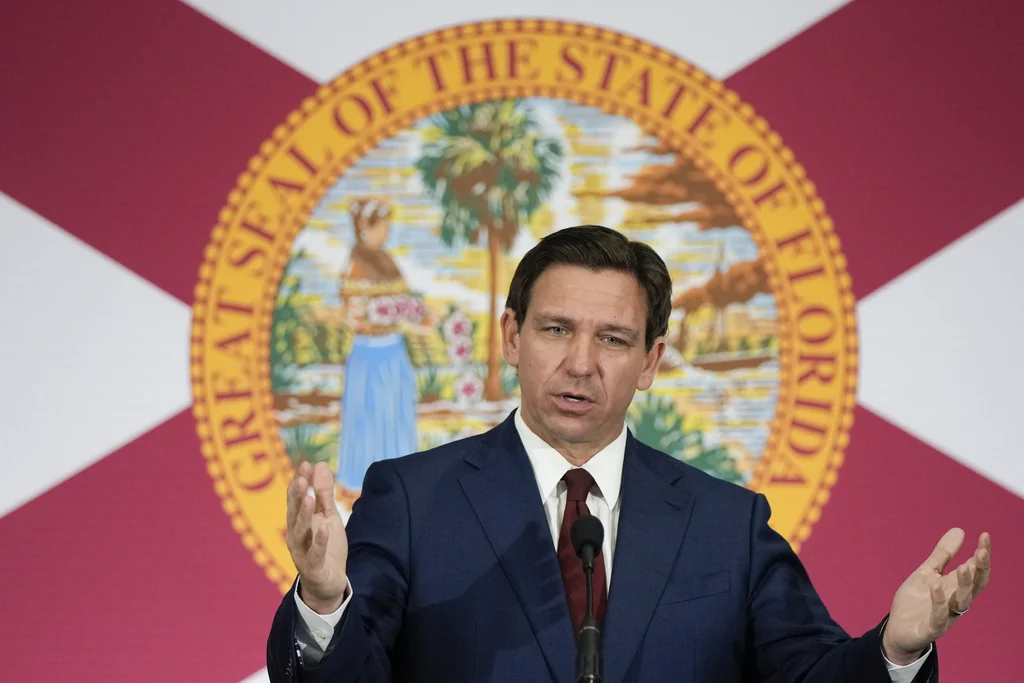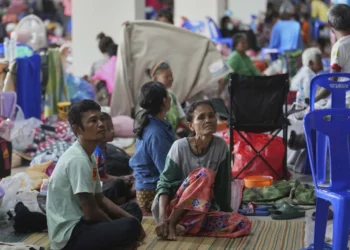Beginning July 1, a new wave of laws from California to Virginia will go into effect, covering everything from mental health for minors to changes in requirements for concealed carry permits.
In California, new laws will make it easier to cancel subscriptions and force Airbnb and other rental companies to disclose any additional fees or penalties related to clean up at checkout. In Virginia, anyone who spreads rumors or threatens to shoot, bomb, burn, or destroy any building or public place will be charged with a Class 5 felony, which comes with 1-10 years in prison and a fine of up to $2,500.

In Indiana, a law will go into effect requiring state officials to purchase the base or standard model of a car. The legislation came after Indiana Secretary of State Diego Morales and Lieutenant Gov. Micah Beckwith each bought expensive vehicles with taxpayer dollars, including a $90,000 GMC Yukon Denali and a nearly $88,000 Chevy Tahoe High Country.
In Florida, a whopping 70 new laws will go into effect. These include everything from executions to revising state regulations on “dangerous dogs” to requiring all public school material to reflect the federal government’s recent redesignation of the Gulf of Mexico as the Gulf of America.
Here is a look at some other laws set to take effect on July 1.
California
Sale of stolen goods
Senate Bill 1144 requires online platforms such as Facebook Marketplace and eBay to collect information on high-volume third-party sellers. The marketplaces must also post a policy prohibiting the sale of stolen goods and provide a way for consumers to report suspicious listings. Once notified, the platforms are required to alert law enforcement if they know a third-party seller is selling or attempting to sell stolen goods to someone in California.
Food delivery
Food delivery companies will be required to provide the first name and picture of the person delivering their food to customers. The new law does not apply to orders directly received through a restaurant’s website.
Mental health help
SB 1063 requires all California schools, public and private, that serve students in grades 7-12 to print the number for the 988 Suicide and Crisis Lifeline. The law also encourages schools to include a QR code linking to local mental health resources and support websites.
School bus drivers
Drivers hired to transport students to and from school must meet new requirements, including passing background checks, drug and alcohol tests, and having “satisfactory” driving records. The new law also requires school buses to be inspected every 12 months or 50,000 miles and have fire extinguishers and first aid kits on board.
Minimum wage
Minimum wage hikes go into effect for several California cities in July. In Alameda, it is $17.46; in Berkeley, $19.18; in Emeryville, $19.90; in Fremont, $17.75; in Milpitas, $18.20; and in San Francisco, $19.18.
Colorado
Concealed carry permit
Applicants will be required to have at least eight hours of in-person instruction and pass a live-fire test where they must shoot a minimum of 50 rounds before they are eligible to obtain a concealed carry license. Those seeking renewal permits will also have to show proof of training from a verified instructor within 6 months of their renewal application.
The state’s gun laws have grown increasingly restrictive over the past few years.
In April, Gov. Jared Polis (D-CO) signed one of the most restrictive gun regulations ever passed in Colorado, which outlaws the manufacture of certain semiautomatic firearms, including the AR-15 and AK-47 rifles.
That law goes into effect next year.
Florida

Prank calls
A new law will enhance criminal penalties for violations related to the misuse of emergency communication services, including 911. Anyone caught calling in a false report could be charged with a third-degree felony. The charge gets bumped up to a second-degree felony if someone dies due to the report.
Someone who causes someone else to make a false 911 call can also be held liable under the new law.
“Swatting has no place in the state of Florida,” Gov. Ron DeSantis (R-FL) said. “When you have swift penalties, strong penalties administered swiftly, you will deter it from happening in the future.”
General knowledge
This Florida bill exempts school social workers from demonstrating “the mastery of general and subject area knowledge” required for other teacher and educator certification.
Gage’s Law
This law is named after Gage Austin Taylor, who died in 2022 from a fentanyl overdose. The law requires hospitals to include fentanyl testing as part of urine drug screens for people receiving emergency services. If the urine test is positive for fentanyl, the hospital must perform a follow-up test. The results must be kept in the patient’s hospital records.
Indiana
Transgender ban extended
Transgender women participating in college sports will no longer be allowed to play on women’s teams starting July 1. The new law, House Bill 1041, follows a 2022 law that prohibits transgender girls from participating in K-12 sports. However, it is unclear how much of an effect the new law will have. There are fewer than 10 transgender athletes who are active in the NCAA, and none live or go to school in Indiana.
Student IDs
Senate Bill 10 stops college students from using their school IDs as voter identification. Critics have argued that it will discourage college students from voting or getting involved in the political process, while supporters say it protects against voter fraud. Last month, advocacy groups Count Us In and Women4Change Indiana, along with an Indiana University student, filed a lawsuit in U.S. District Court for the Southern District of Indiana alleging the law is an unconstitutional “surgical attack on young voters” that restricts their rights.
Real meat
House Bill 1425 bans the sale and manufacturing of lab-grown meat for two years. Lab-grown meat refers to a food product made from animal stem cells and arranged in a structure that contains a similar taste and texture to actual meat products. After the two years are up, the new law will require manufacturers to label their product with the phrase, “This is an imitation meat product.”
Politics on the school board
This law allows candidates running for their local school boards to note their party affiliations next to their names on the ballot. The law also allows candidates to identify as independents if they choose or leave blank spaces by their names if they do not want to disclose their party affiliations.
Vermont
Expanded parental leave
Starting next month, the state will expand its unpaid parental leave. It also changes the definition of “family” to make it more inclusive of LGBT residents, and it guarantees, for the first time, that employees can take off work after the death of a family member.
The law is designed to let employees take care of personal and family matters without fear of losing their jobs, the bill’s sponsor, state Rep. Emilie Krasnow, said in a statement.
“It may seem like a small step, but it is very mighty because often our previous laws need to catch up with the world that we’re in today,” she said.
It also changes the definition of “family” to make it more inclusive of LGBT residents.
Wage range
A new law will require employers in the state with five or more employees to include wage ranges in job advertisements.
Virginia
Backseat seat belts
Starting in July, adults will be required to wear seat belts in the back seat of a car. The law, sponsored by Del. Karen Keys-Gamarra, is an update to one that only required adults to buckle up in the front seat. If caught, violators will face a $25 fine. The push for stronger seat belt laws comes after the state was ranked the worst in the nation for seat belt use in 2023, according to the National Highway Traffic Safety Administration. Virginia clocked in with just 73.2% of residents buckling up. The national average was 91.9%.
Lottery
A new law prohibits the Virginia Lottery from disclosing the identity of anybody who wins $1 million or more. Previously, the rule was for those who won $10 million or more. Supporters argued that personal privacy was at stake, while those who opposed the bill argued that disclosure added transparency to the process. Forty-five states have lotteries. Of those, 21 allow winners to stay anonymous.
Porch pirates
Mail theft in Virginia will soon be a Class 6 felony, which means people caught stealing mail or packages can be punished by imprisonment for one to five years and/or a fine of up to $2,500. The new law gives local prosecutors the ability to bring charges in addition to existing federal penalties.
“The goal was to mirror the federal law so that prosecutors had another tool in their tool belt,” state Sen. Saddam Salim said.
FLORIDA PROPOSES LARGE IMMIGRANT DETENTION CENTER IN THE EVERGLADES DUBBED ‘ALLIGATOR ALCATRAZ’
He added that federal prosecutors are limited and do not have the resources to go after every single lawbreaker and that Virginia’s law allows local law enforcement to get involved.
Schools and online safety
A new rule mandates that all public schools in the state must put anti-cyberbullying policies in place. They must also include guidance on handling incidents that happen outside of school and include a list of resources for victims.
















